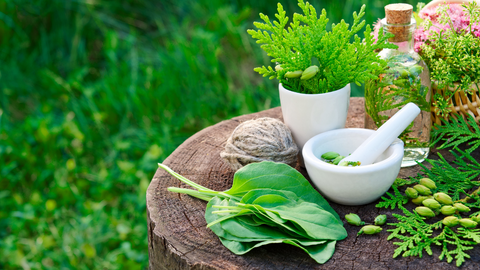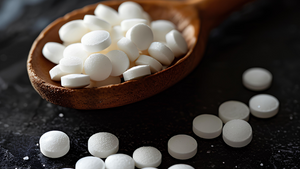Herbal Medicine and Homepathy: What's the Difference?
Herbal medicine is NOT homeopathic and homeopathy has nothing to do with herbalism. Holistic or alternative medicine practices include homeopathy, but it is just one of the many options along with herbal medicine. While homeopathic experts claim that homeopathy is holistic, I would argue that it is lacking in the whole-body focus necessary to qualify. That’s likely to ruffle some feathers, but bear with me and I’ll explain- because it is, after all, just my opinion.
Before we go any further- I have homeopathic remedies in my cupboard, so if you think this is going to be a hit piece and had already texted your homeopathic friends who own pitchforks… put down the farm implements and give me a few minutes of your time.
Is Homeopathy the Same As Herbalism?
Not even a little bit.
I hear so many of my customers say that they would like to try our products because they are interested in being more homeopathic. If you are looking to access plant-based remedies that still have the plant IN the product you aren’t looking for homeopathy.
I think homeopathy has captured the market of moms who need something relatively safe, easy to use and easy to store… much like the essential oil craze… and that’s an opinion post for another day!

What Are the Differences Between Herbalism and Homeopathy?
Herbalism
- Treatment: Sometimes just one herb, but often combinations of herbs are used to address multiple symptoms of an illness
- Ingredients: Plants
- Action: Primarily phytochemical actions within the plant, nutrition, and in many cases complimentary energetic aspects
- Theory: Chemicals found within the plant have known actions in the human body and support healing when applied.
- Side Effects: Possible. Herbs must be used in the correct amount for the right person.
Homeopathy
- Treatment: One Therapeutic at a time (unless dispensed by a licensed practitioner in rare cases)
- Ingredients: Plants, minerals, salts, insect, animal and even disease materials
- Action: Entirely energetic imprints of biologic substances (no chemical structures remain in the final remedy)
- Theory: Like cures like. Something that causes illness or symptoms in a healthy person can be used to treat that same illness of set of symptoms experienced by someone who is ill.
- Side Effects: Possible. You can cause the very symptoms you were trying to eliminate.
How Does Homeopathy Work?
Homeopathy works as an energetic medicine. There are no phytochemicals to exert a change in the body. There is no nutritive action to support the health of a body system. Many times the cure is a known toxin that if given in its whole form would be dangerous, but in dilution is theorized to encourage the body to heal itself.
Like many of our other Western traditions of natural health (the Eclectics, Thomsonian medicine, chiropractic, etc.) homeopathy emerged at a time when Western medicine had become incredibly toxic- purging and prescribing dangerous mercury therapies. It was a reaction to the Western medical mindset that is still pervasive today- cut away, purge, use a hammer when a feather might suffice. It was a breath of fresh air… and people stopped dying in droves simply by choosing a more gentle approach.
How Do I Make Homeopathic Medicine at Home?
It isn’t done. Herein lies my biggest criticism of homeopathy. You won’t pick up a book on homeopathy and read about how to grow, pick and then make your own remedies.
I’m not a big fan of remedies that you can’t readily access in your own back yard and kitchen. Are there wonderful offerings in the store- YES! But, I tend to focus on how to support the self-sufficiency of my family and my readers. Homeopathic medicine, while convenient to carry and compact for storage, gets an “F” on the sustainability scale. You cannot reproduce it. If this is your main method of maintaining health or dealing with first-aid situations in your family you are entirely dependent on the company that makes it, the supply chain that moves it, and the store that sells it.
It is possible to dilute a traditionally made tincture, but it wouldn’t have the same potency and therefore, not the same effect as homeopathic remedies that have been studied. Would it work? Possibly. But you would basically be testing things out as if it were a new remedy.

How Are Homeopathic Products Made?
Homeopathic products are made in a pharmacy or lab. While herbs are classified as supplements, homeopathics are considered drugs. This is because they are made under very exacting standards. The dilutions of each remedy are done in a very specific way so that certified homeopathic producers are putting standardized products out on the market.
This is the big reason that I give homeopathy an “F” on the sustainability scale.
Here’s a very high level and oversimplified explanation of how these remedies are created:
- You start with a tincture- let’s say of arsenic (arsenicum album). This is made just like an herbal tincture would be made- by soaking a substance, in this case arsenic, in alcohol to extract its chemical qualities and then straining out the solids.
- You would add 1 part of arsenic tincture to 9 parts alcohol or water. Then you would bang it against the palm of your hand to potentize the mixture (succuss it). You have now diluted it to 1x.
- You then would pour 1 part of the mixture from #2 into a new container and add another 9 parts of alcohol or water. Then it is succussed again against the palm of your hand. You have not diluted your mixture to 2x.
- You would repeat #3 until you reach the desired dilution. The most common dilutions are 6x, 9x, 12x, 24x or 30x.
As you can see, the longer you go, the less you have any of the actual phytochemicals contained in the original tincture left in your homeopathic dilution.
Does Homeopathic Medicine Really Work?
The truth? Homeopathic medicine has been around since roughly 1811. The Western medical establishment does not recognize it as “medicine” because you can’t put the contents of any of the remedies under a microscope and analyze them… you can’t “prove” homeopathic medicine works with their methods. Nonetheless, I would argue that the number of anecdotal success stories does not logically support the notion that homeopathic remedies are effective only as placebos. I am certainly not alone in that assessment, as homeopathic medicine is well regarded in many countries around the world. In some cases, it is regulated and regarded as equally valid as any other conventional medical practice.
So, my personal conclusion is this- I don’t put a lot of stock in homeopathic remedies. There is only one that I have used personally, and I believe it worked for me. I don’t like therapeutics that require me to be dependent on a laboratory to make them… and I am not comfortable with the lack of nutritional therapy that is involved in homeopathy. As a plant scientist, I am much more comfortable understanding plants and having a relationship with them in a more grounded manner. So I will most likely continue to preference herbal therapies over homeopathics.
Should You Stop Using Homeopathics?
NO! If you find them to be effective for you, there is no reason to assume they are the fraud that Western medicine would like to paint them as. There is no good reason to assume these remedies are harmful or ineffective… and they continue to be another part of our arsenal to care for ourselves and our families in a less toxic manner than prescriptions and over-the-counter medicines.
My one bit of advice would continue to be- please be sure you know how to take care of yourself and your family using readily available remedies that you could grow or harvest out of the weeds in your lawn. I can’t caution you enough to make sure you have access to something that doesn’t demand your dependence on a system that is regulated and controlled by forces outside of your family. Use homeopathics for as long as you can, but hedge your bets and be sure you are looking at a backup plan.
If you would like to learn more about how to use plants instead of lab created solutions for health independence, check out my Proactive Health Club. Get 7 days FREE to check it out at this LINK.


